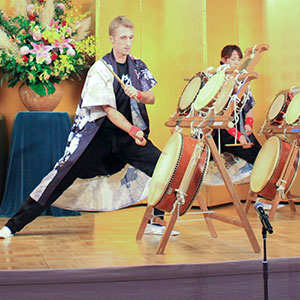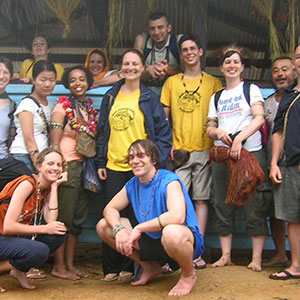Drawing on experiences to support international education
Now in its 27th year, the Japan Exchange and Teaching (JET) Programme has welcomed over 55,000 people from 62 countries to deliver grassroots international exchange between Japan and other nations. Sixth in our series, this column features former JETs, both in the UK and Japan, who keep the idea of fostering mutual understanding firmly at heart.
My three years spent on the Japan Exchange and Teaching (JET) Programme were never dull.
The first few months in particular seemed to be an endless stream of unusual experiences—from popping a sparrow’s head into my mouth at a yakiniku (Japanese-style BBQ) restaurant, to believing I had been propositioned in the staffroom by the 50-year-old PE teacher. It was certainly an effective way to learn that the Japanese word for stapler is hotchikisu.
Approaching graduation from the University of Glasgow in 1997, my mind was set on a career in journalism. A Bachelors degree in English and Politics, together with experience working for student newspapers convinced me that was where my long-term future lay.
But, still not 22, I thought a year spent gaining some experience of another lifestyle would benefit me. Having spent an incredible week on a homestay in Aichi Prefecture as a 16-year-old, the notion of a longer stay in Japan always appealed enormously and, on learning about the JET Programme, deciding to apply was easy.
I was placed as an assistant language teacher (ALT) in Tomisato-shi, a place which, for all its geographical proximity to Narita International Airport, seemed a million miles away from an international environment. My walking into the grounds of an elementary school was always met with a myriad of wide-eyed stares and exclamations of surprise.
As well as teaching English classes at elementary and junior high school, I found many other rewarding activities. I spent time in the classes for students with special needs, and went to the town’s community centre to see the students who, for whatever reason, felt unable to attend a regular school.
As I reached the end of my JET Programme contract, working in journalism was still on my mind, but I was now thinking seriously about a career in teaching, and was not that keen on leaving Japan. When I was recommended for a job in nearby Sakura-shi, I readily accepted.
The position was not dissimilar to my previous one, but there was a greater degree of classroom autonomy, particularly in later years when I was doing teacher training, which I enjoyed immensely.
I knew then that my future lay in education, and studied for a Masters degree in Teaching English as a Foreign/Second Language through the University of Birmingham’s distance learning programme.
By that time, I was also married, a father of two boys, owner of a house and a permanent resident of Japan.
Once again, I was incredibly fortunate to find another job that I enjoyed as much—my current position as a programme instructor at NIC International College in Japan, based in Shinjuku. I teach courses on a one-year programme, intensive English for Academic Purposes, for Japanese students planning to study at a university overseas.
Although from a variety of backgrounds, and with very different levels of ability, the students all share the dream of studying overseas, and the motivation that goes with that.
Every April, as I see the graduates move on to the next stage of their lives, the feeling that I have played a small role provides immense job satisfaction.
Students of NIC go to the US, Canada, Switzerland, Australia, New Zealand, India and the UK. Given the UK’s worldwide reputation for excellence in education, it is unsurprising that there is significant interest among the students in studying at a British university. However, it is a daunting prospect for many.
From my experience on the JET Programme I know all too well what a challenge—and rewarding experience—it can be to live in a country that is vastly different from your own.
The Japanese staff, native English-speaking faculty and I strive to prepare the students for their experiences abroad, by not just teaching English, but also providing support.
This is done in various ways, from sharing cultural differences with them to encouraging them to have a more critical approach in the analysis of class texts, and simply being more outgoing and inquisitive in the classroom.
After arriving in Japan following four wonderful years at the University of Glasgow, and having benefited enormously from my studies with the University of Birmingham, it gives me great pleasure that, 17 years after joining the JET Programme, I find myself helping Japanese learners to have similar opportunities.
What is more, through online social networks, I am able to see their progress, and introduce them to some of my fellow ex-JETs, who are back in the UK, and doing their part to strengthen the bonds between our two great countries.





